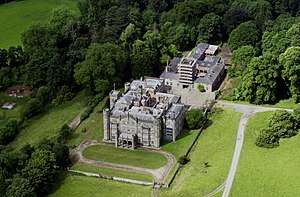William Whitmore (died 1648)
Sir William Whitmore (4 November 1572 – December 1648) was an English landowner and politician who sat in the House of Commons at various times between 1621 and 1626.

Whitmore was the son of William Whitmore merchant of London and his wife Anne Bond, daughter of alderman William Bond. He inherited an estate including property at Apley, Shropshire on the death of his father in 1593. Using proceeds from property investment and related lending schemes, he was able to greatly extend the original estate.[1] He was Sheriff of Shropshire in 1620.[2] In 1621, he was elected Member of Parliament for Bridgnorth.[3] He was knighted at Greenwich on 24 or 28 June 1621.[4] In 1624 he was re-elected MP for Bridgnorth. He was elected MP for Bridgnorth again in 1626.[3]
Whitmore died at the age of 76.
Whitmore married firstly Margaret Moseley, daughter of Rowland Moseley of Hough, Lancashire and had a son and daughter. She died in 1608 and he married secondly Dorothy Weld, daughter of John Weld of London. He had three sons of whom the eldest Thomas was MP and was created a baronet.[2]
References
- [https://www.historyofparliamentonline.org/volume/1604-1629/member/whitmore-william-1573-1648 The History of Parliament: the House of Commons 1604-1629,
- John Burke, John Bernard Burke A genealogical and heraldic history of the extinct and dormant baronetcies
- Browne Willis Notitia parliamentaria, or, An history of the counties, cities, and boroughs in England and Wales: ... The whole extracted from mss. and printed evidences 1750 pp176-239
- Knights of England
Further reading
- Andrew Thrush/Simon Healy. "WHITMORE, William (1573-1648), of Apley Park, Salop". History of Parliament. Retrieved 16 September 2018.
| Parliament of England | ||
|---|---|---|
| Preceded by John Pierse Richard Singe |
Member of Parliament for Bridgnorth 1621–1624 With: Sir John Hayward George Smith |
Succeeded by Walter Acton John Bennet |
| Preceded by Walter Acton John Bennet |
Member of Parliament for Bridgnorth 1626 With: John Bennet |
Succeeded by Sir Richard Shelton Sir George Paul |